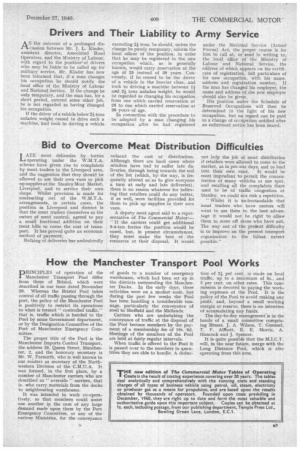How the Manchester Transport Pool Works
Page 15

If you've noticed an error in this article please click here to report it so we can fix it.
PRINCIPLES of operation of the Manchester Transport Pool differ from those of Bristol, which were described in our issue dated November 29. Whereas the Bristol Pool takes control of all traffic passing through the port, the policy of the Manchester Pool is positively to restrict its operations to what is termed "controlled traffic," that is, traffic which is handed to the Pool by some Government department, or by the Designation Committee of the Port of Manchester Emergency Committee.
The proper title of the Pool is the Manchester Imports Control Transport, the address 28, Queen Street, Manchester, 2, and the honorary secretary. is Mr. W. Parnorth, who is well known to our readers as secretary of the Northwestern Division of the C.M.U.A. It was formed, in the first place, by a number of Manchester carriers who are described as " overside " carriers, that is, who carry materials from the docks to neighbouring warehouses.
It was intended to work co-operatively, so that members could assist one another in the case of any large demand made upon them by the Port Emergency Committee, or any of the various Ministries, for the conveyance
of goods to a number of emergency warehouses, which had been set up in the districts surrounding the Manchester Docks. In the early days, these activities were on a modest .scale, but during the past few weeks the Pool has been handling a considerable tonnage, particularly the conveyance of steel to Sheffield and the Midlands.
Carriers who are undertaking the conveyance of traffic at the disposal of the Pool become members by the payment of a membership fee of 10s. 6d. Meetings of the members of the Pool are held at fairly regular intervals.
When traffic is offered to the Pool it is passed over to the members in quantities they are able to handle. A deduc tion of 21 pet cent, is made on local traffic, up to a maximum of 5s., and 5 per cent. on other rates. This commission is devoted to paying the working expenses of the Pool. It is the policy of the Pool to avoid making any profit, and, beyond a small working margin or reserve, there is no intention of accumulating any funds. _
• The day-to-day management is in the hands of a small committee comprising Messrs. J. A. Wilson, T. Gem.mel, T. F. Abbott, E. E. Morris, A. Hancock and J. Spencer.
It is quite possible that the M.I.C.T. will, in the near future, merge with the Long Distance Pool, which is also operating from this area.














































